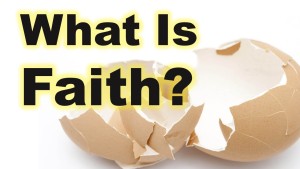Most people claim to have it, but no one defines it in the same way. Some talk about it, while others keep it private. Many think you take it with you when you die, while some think it helps you enjoy the ride but dies with you.
What is it?
The answer to the riddle is “faith.” Everyone has faith in some kind of worldview that explains reality. And while faith is as common as the air we breathe, our increasingly diverse society reveals increasing variety related to what this little word actually means.
So what’s your definition?
Try this multiple choice quiz: What does real faith look like?
- Attending an event such as a worship service
- Personal spirituality
- A lifestyle
Which would you choose? Let’s look at the options:
Option A: Faith as an Event.
We often understand faith as it relates to religious programming, such as a worship service, group, or affinity based program. These events involve two kinds of people—providers and consumers. Providers (paid staff and/or recruited volunteers) work hard to create and meet demand for religious events, while ensuring prospective attenders that the event will satisfy their ongoing spiritual needs. This is tough business, though, because consumers today are busier than a one-armed swimmer, with volumes of competing options and demands for their time. Thus, providers must program around our hectic schedules and devise communication systems that maximize participation.
Today, traditional marketing is failing to pierce the ever-present fog of messaging that dizzies consumers, just as traditional religion fails to engage those who are beyond overstretched by life. So the whole system of event-based faith, which requires a target market of interested and available participants, is in jeopardy. To put it bluntly, it’s dying.
Option B: Personal spirituality.
This second definition of faith is in part a rejection of the first. Today more than ever, people self-identify as “spiritual” based upon a personal sense of faith. Reacting to the hollowness of consumeristic religiosity and/or the conflict associated with public religiosity, many give up on “organized religion” in hopes of salvaging a more personal expression of faith. In our culture, it’s normal to hear someone define themselves as “spiritual,” yet find no value in an active role in a church. Most people believe in some form of a higher power, even as their attachment to a particular faith tradition or institution wanes.
The two shortcomings of personal spirituality have to do with its absolute relativity and hyper-individuality. Without a normative vision to frame my worldview, I’m left to my own musings. Anything goes, as long as I don’t feel too guilty about it. And without communal support and accountability, no one asks me honest questions or offers wisdom for my spiritual journey. My faith life is private, relative, and quite selfish, with little hope of growing past my personal limitations.
Option C: Faith as a lifestyle.
Faith as a lifestyle envisions my entire reality as one, continuous worship service (Romans 12:1-2), which invites me to re-understand each aspect of my life as part of God’s plan for the world. This includes my relationships, work, play, and private time. It’s a lifestyle based on a personally relationship with God through Jesus (speaking as a Christian).
Biblical faith obliterates the boundaries that compartmentalize life into unrelated, sacred or secular spheres, bathing every moment of every day with Divine purpose and meaning. This is the Hebrew notion of “Shalom,” the wholeness, completeness and peace that God wants for his creatures in a world that tends to fragment our lives. It’s a life of integrity (consistency throughout), rather than hypocrisy (duplicity throughout). Faith is the reintegration of the disembodied elements of my existence around the person and work of Jesus, which allows me to finally be whole again. Humpty Dumpty gets put back together, I get saved, and God wins.
Redefining faith as a daily relationship with God doesn’t eliminate the need for religious events or private spirituality. Quite the opposite. Just as soldiers need training and meetings to stay on mission, people of faith must gather to be informed, equipped, and encouraged so that they can pursue God’s mission for their lives. Faith as a lifestyle actually demands more time with other believers, more time in prayer, more time listening to Scripture, and more time in worship. It requires that we reprioritize from among the ridiculous demands of our culture, in order to live with a laser-like focus on God’s plan. But these “events” are different now. They no longer feel like irrelevant chores dutifully done to appease God or Gramma. They’re essential to the life-giving identity and mission we’ve discovered in Jesus (Matthew 28:18-20).
And one more thing—this definition of faith actually saves the world (I John 5:4). Lifestyle faith both reintegrates my life and sends “whole” and “healthy” people into the world to bring about God’s Shalom. God transforms the world through we who embody His vision for life in our schools, workplaces, homes, and neighborhoods. As we do so, busy people discover that they have something to live for beyond paychecks, food, and play. They discover Shalom in Jesus.
Neither event-based faith nor private spirituality have the power to put our Humpty-Dumpty-world back together again. And where all the king’s horses and all the king’s men fall short, the lifestyle of faith is God’s recipe for personal and global repair.
God’s grace is given to be savored and shared, not hidden, hoarded, or registered for attendance.
God, forgive me for seeing faith as a private reality or consumeristic event. Forgive me for trying to squeeze faith into “my” busy life, and surround me with people who aren’t too busy to change the world with me. In Jesus’ Name. Amen.
And by the way… the answer is C.

